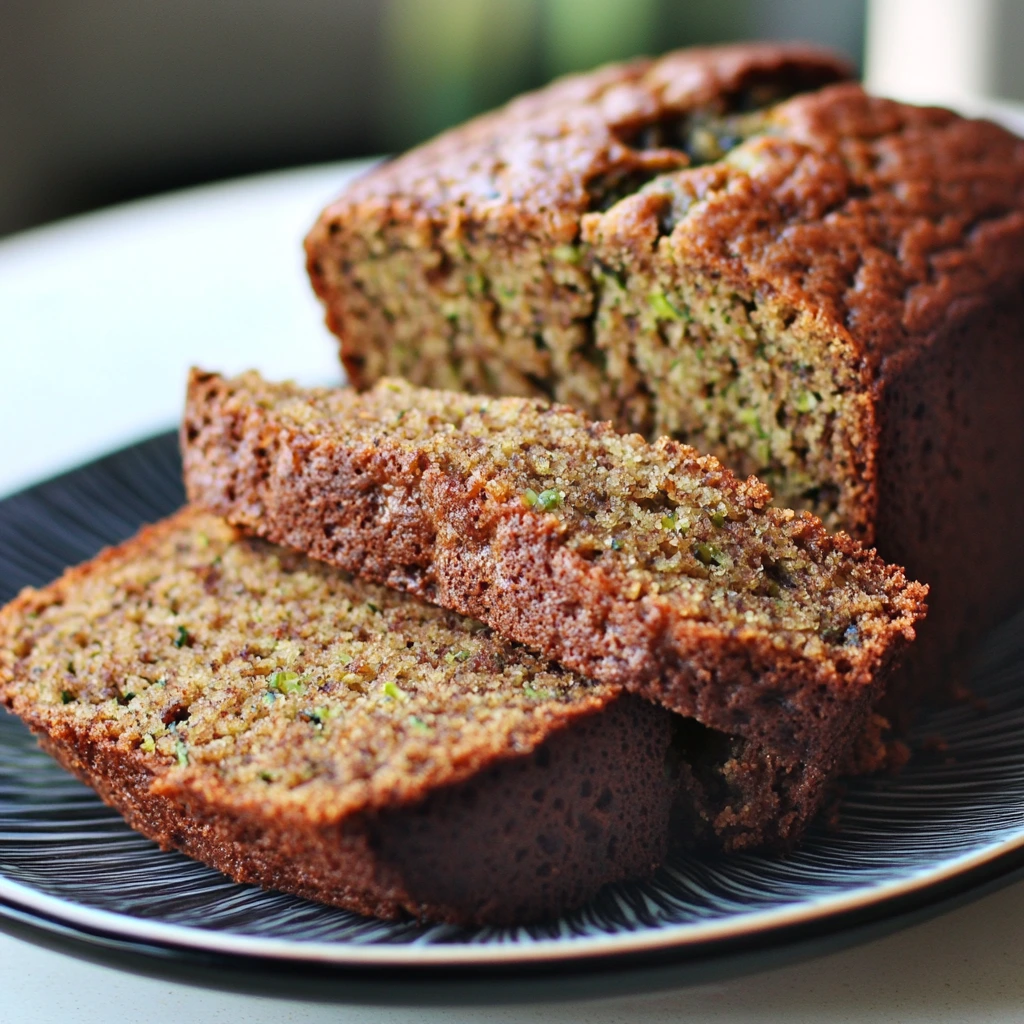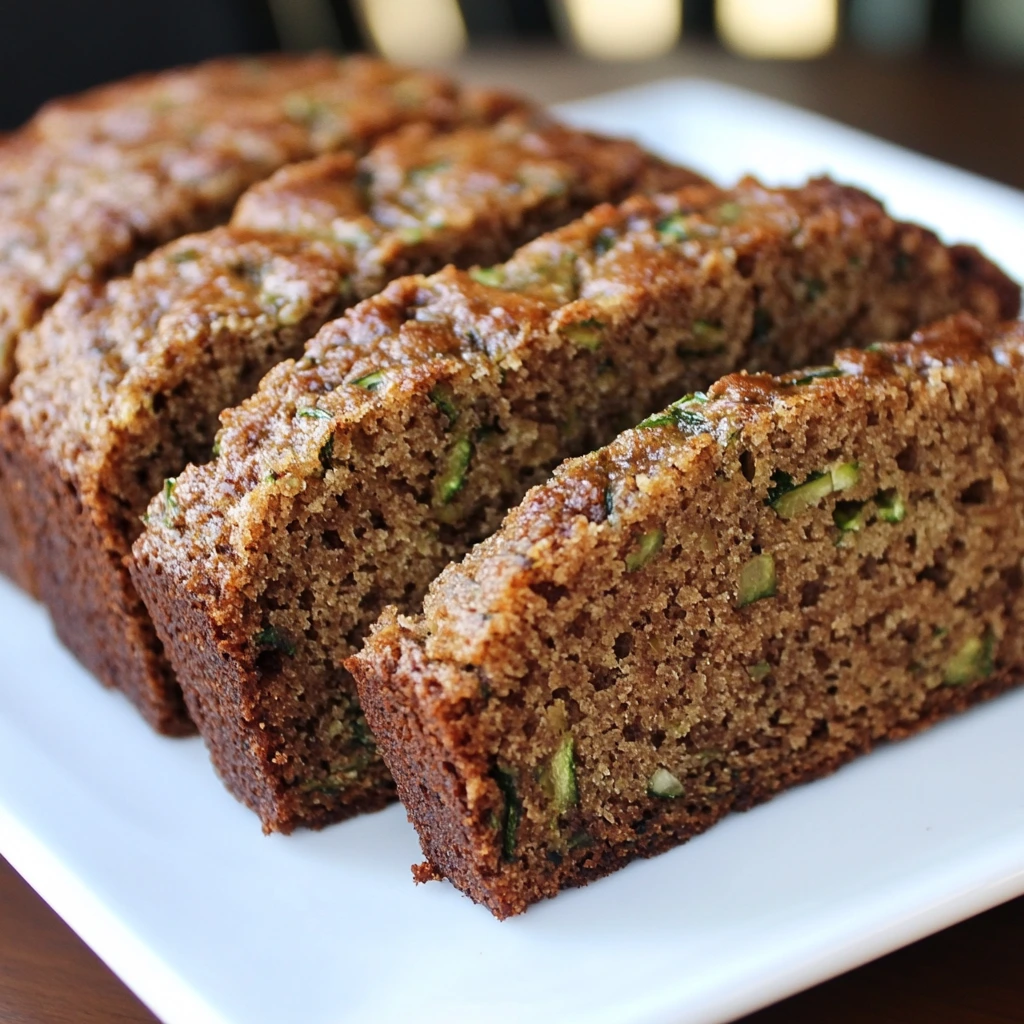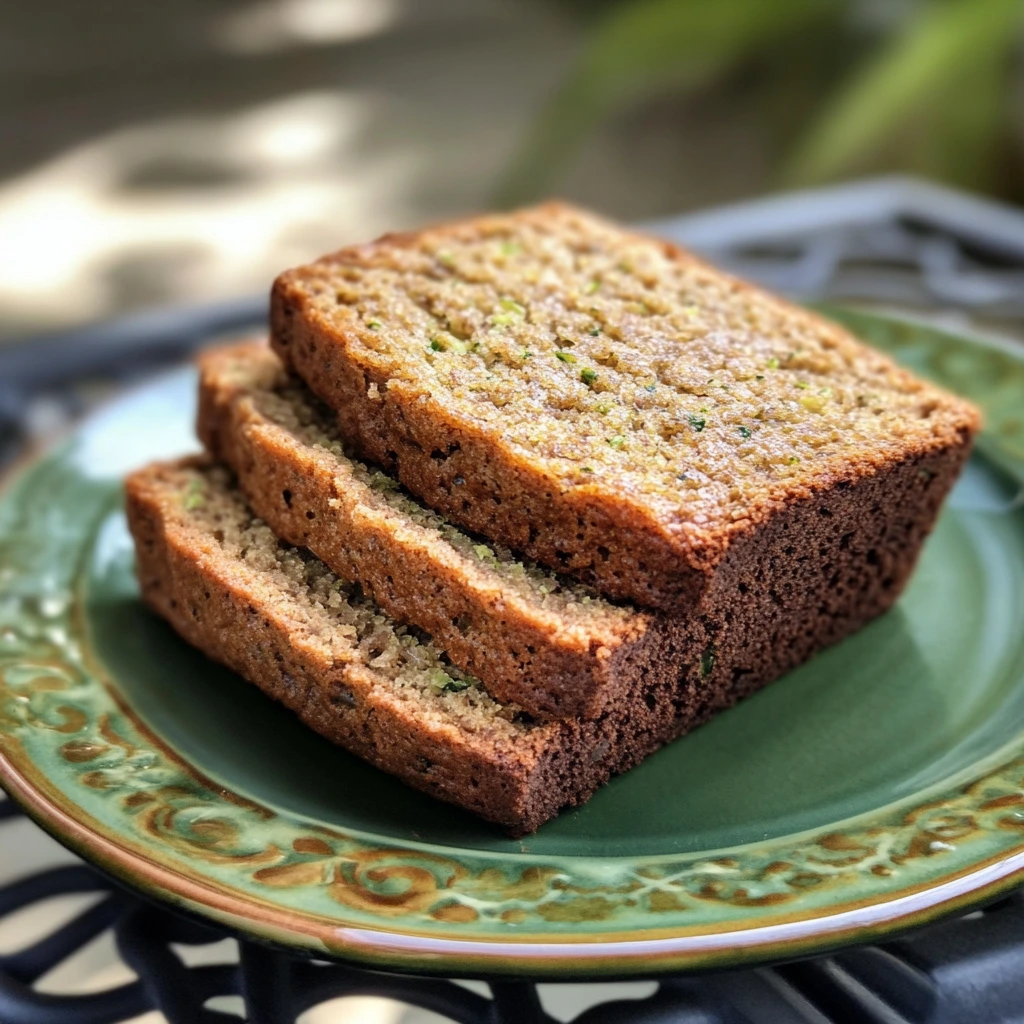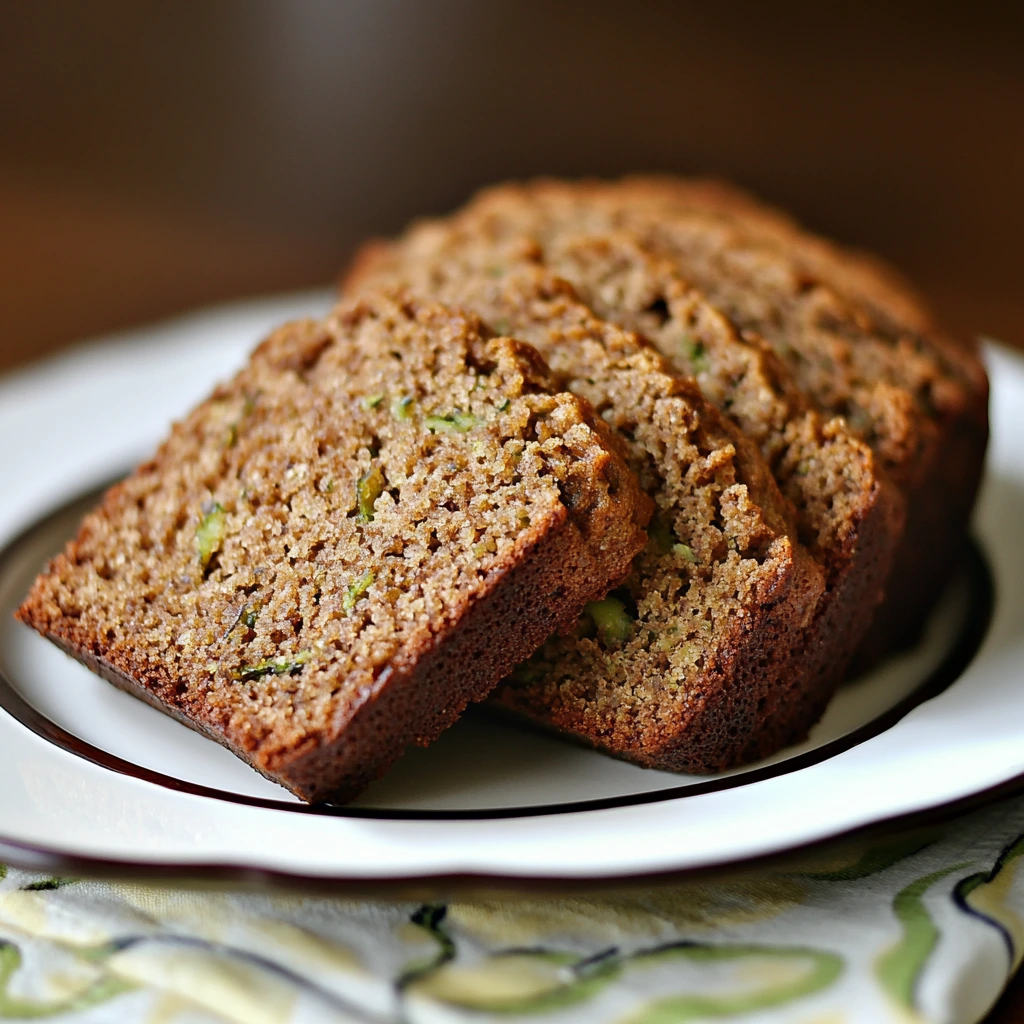Zucchini bread is a beloved treat that’s both delicious and surprisingly healthy. Often thought of as a guilty pleasure, it’s time to rethink this humble baked good. Packed with nutrients and made with wholesome ingredients, zucchini bread can be a great addition to a balanced diet. But what makes it so good for you? In this post, we’ll explore the unexpected health benefits of zucchini bread, from its high fiber content to its role in supporting heart health and digestion. Whether you’re looking to satisfy your sweet tooth or add more vegetables to your diet, zucchini bread offers a tasty and nutritious way to do both!

What Makes Zucchini Bread a Healthy Choice?
Zucchini bread may seem like just another indulgent baked treat, but it’s packed with unexpected health benefits that make it a great choice for those looking to enjoy something delicious and nutritious. The magic behind zucchini bread’s healthiness lies in its key ingredients, with zucchini being the star player. Let’s dive into why zucchini bread is a smart addition to your diet.
Nutritional Benefits of Zucchini in Bread
Zucchini, the primary vegetable in zucchini bread, is a low-calorie powerhouse that provides a variety of nutrients with very few calories. One cup of shredded zucchini contains only about 19 calories, making it a guilt-free way to add volume and texture to your baked goods. It’s also an excellent source of vitamins A and C, which help support immune function and skin health. The high water content of zucchini helps keep the bread moist without needing to add excess oils or fats, further lowering the overall calorie content.
Additionally, zucchini is rich in potassium, an essential mineral that helps regulate blood pressure and maintain proper muscle and nerve function. By incorporating zucchini into your bread, you’re sneaking in these valuable nutrients without compromising on flavor.
Why Zucchini is a Superfood
Zucchini may not always make it to the top of your superfood list, but it definitely deserves a spot! This vegetable is packed with antioxidants like carotenoids, including lutein and zeaxanthin, which are known to benefit eye health and may reduce the risk of age-related eye conditions. Antioxidants are also vital for fighting oxidative stress in the body, which can contribute to chronic diseases and aging. By adding zucchini to your bread, you’re boosting the overall antioxidant intake of your diet in a simple and tasty way.
Moreover, the fiber content in zucchini supports digestive health. As a low-calorie, high-water vegetable, zucchini helps keep you hydrated and promotes healthy bowel movements. Fiber is also important for controlling blood sugar levels, making zucchini bread a great choice for people managing their blood sugar levels.
Zucchini Bread as a Fiber-Rich Snack
Fiber is a key component of a healthy diet, yet many people struggle to get enough. Zucchini bread, thanks to the zucchini itself and the whole wheat or other fiber-rich flours used in the recipe, is a great way to meet your daily fiber goals. The fiber in zucchini bread helps keep your digestive system running smoothly, preventing constipation and promoting regularity.
Additionally, fiber plays a critical role in weight management by helping you feel fuller for longer. The combination of fiber from zucchini and whole wheat flour can make zucchini bread a satisfying snack that curbs hunger without causing a blood sugar spike. This makes it a far healthier option than many other sweet baked goods that are high in refined sugars and lack nutritional value.
The Key Ingredients That Boost Zucchini Bread’s Health Benefits
The health benefits of zucchini bread extend far beyond the zucchini itself. The beauty of this dish is that it can be made even healthier by choosing the right ingredients. By swapping out refined sugars, flours, and fats for more nutritious alternatives, you can significantly enhance the bread’s health benefits while keeping it just as delicious. Let’s take a closer look at the key ingredients that contribute to making zucchini bread a wholesome choice.

Whole Wheat and Almond Flours: Healthier Alternatives
Traditional zucchini bread recipes often call for refined white flour, which lacks essential nutrients and fiber. However, by substituting whole wheat flour or almond flour, you can increase the nutritional value of your bread significantly.
Whole Wheat Flour: Whole wheat flour retains the bran, germ, and endosperm of the wheat kernel, which means it contains more fiber, vitamins, and minerals than refined white flour. The added fiber in whole wheat flour not only improves digestion but also helps regulate blood sugar levels, making zucchini bread a better option for those managing diabetes or looking to maintain stable energy levels. Whole wheat flour also provides B vitamins, which are essential for energy metabolism and brain health.
Almond Flour: For those looking for a gluten-free option, almond flour is an excellent choice. Made from finely ground almonds, almond flour is rich in healthy fats, protein, and fiber. This makes it a great alternative for boosting the bread’s nutrient profile. Almond flour also provides magnesium, a mineral that helps support heart health and muscle function. Its lower carbohydrate content compared to traditional flour makes zucchini bread lower in glycemic index, which is beneficial for those trying to control blood sugar levels.
Sugar Substitutes for a Healthier Zucchini Bread
Traditional zucchini bread recipes can be high in refined sugar, which can lead to spikes in blood sugar and contribute to weight gain if consumed in excess. However, there are several natural and healthier sugar substitutes that can make your zucchini bread both sweet and nutritious without the sugar overload.
Honey or Maple Syrup: These natural sweeteners are often used as alternatives to refined sugar in healthier baking recipes. Honey and maple syrup not only provide sweetness but also contain antioxidants, vitamins, and minerals. For instance, honey is a good source of vitamin C, while maple syrup contains manganese and zinc, both of which are important for immune health and energy production.
Stevia or Monk Fruit Sweetener: For those looking to cut out sugar entirely, stevia or monk fruit sweeteners are popular zero-calorie, plant-based alternatives. These sweeteners have little to no effect on blood sugar levels, making them suitable for diabetics or anyone looking to reduce their sugar intake. Both options are naturally derived, making them a healthier choice compared to artificial sweeteners.
Using these substitutes not only reduces the overall calorie count of your zucchini bread but also adds beneficial compounds that can enhance your overall health.
Eggs and Other Protein-Rich Ingredients
the classic ingredient in zucchini bread are bread , and they offer several nutritional benefits that can help round out the health profile of your treat. Eggs are a great source of high-quality protein, essential amino acids, and nutrients such as vitamins D, A, and B12, as well as selenium. Protein helps build and repair tissues, supports immune function, and is necessary for enzyme production. The healthy fats in eggs can also support brain health and hormone regulation.
For those looking to reduce the amount of animal products in their diet, plant-based egg substitutes (such as flaxseed meal or chia seeds mixed with water) can be used without sacrificing texture or flavor. These options still provide protein and omega-3 fatty acids, though they come with added fiber and antioxidants.
You can also enhance the protein content of your zucchini bread by adding ingredients like Greek yogurt or nut butters (e.g., almond butter or peanut butter). Greek yogurt is an excellent source of protein, probiotics, and calcium, contributing to gut health and bone strength. Nut butters add healthy fats, additional protein, and a rich, nutty flavor that complements the zucchini bread’s sweetness.
How to Make Zucchini Bread Even Healthier
While bread is already a nutritious option, there are several ways to make it even healthier by incorporating additional wholesome ingredients and making simple modifications. These adjustments can further enhance the bread’s nutritional value, making it a guilt-free treat that supports your health goals without compromising on flavor. Here are a few ways to take your zucchini bread to the next level of healthfulness.

Adding More Vegetables to Your Zucchini Bread
Zucchini is already a healthy ingredient in your bread, but why stop there? You can easily increase the vegetable content and boost the nutritional profile of your bread by incorporating other vegetables. This not only makes the bread more fiber-rich but also adds additional vitamins and minerals.
Carrots: Adding finely grated carrots to your zucchini bread will increase the fiber content and provide a natural sweetness. Carrots are an excellent source of beta-carotene, which the body converts into vitamin A, supporting eye health, immunity, and skin health. The added antioxidants in carrots complement those found in zucchini, making your bread even more nutritious.
Sweet Potatoes or Pumpkin: Grated sweet potatoes or pumpkin can be added to zucchini bread for extra fiber, vitamins A and C, and a rich, moist texture. These vegetables are naturally sweet, so you can reduce the need for additional sugar while enhancing the bread’s flavor and nutritional value.
Spinach or Kale: For an extra green boost, consider blending spinach or kale into your batter. These leafy greens are packed with iron, calcium, and vitamins K and C. They can be finely chopped or pureed to blend seamlessly into your bread without altering the flavor too much. Adding greens not only increases fiber content but also provides a powerful antioxidant punch.
By incorporating a variety of vegetables, you can make zucchini bread a nutrient-dense snack that offers even more health benefits.
Opting for Gluten-Free Versions
For those with gluten sensitivities or those following a gluten-free diet, making it gluten-free is a simple way to make it healthier. Gluten-free flours can provide essential nutrients without compromising texture or taste.
Gluten-Free Flour Blends: Most commercial gluten-free flour blends work well as a one-to-one substitute for regular flour in zucchini bread. Look for blends that contain a mix of rice flour, potato flour, and tapioca starch for a light, fluffy texture. Some blends also contain added fiber or protein, which can boost the bread’s health benefits.
Almond Flour or Coconut Flour: Almond flour is a popular gluten-free option that provides healthy fats and protein. It’s lower in carbs than regular flour, making zucchini bread more suitable for those following a low-carb or ketogenic diet. Coconut flour is another gluten-free option that adds fiber and a mild coconut flavor to the bread. However, coconut flour tends to absorb more liquid, so you may need to adjust the recipe by adding extra eggs or liquids like almond milk to maintain the right texture.
These gluten-free alternatives not only cater to those with dietary restrictions but also make the bread a healthier choice by reducing the glycemic index and providing additional nutrients like magnesium and healthy fats.
Reducing Calorie Count with Smart Modifications
can be made even healthier by reducing its calorie content without sacrificing flavor. A few simple ingredient swaps can help lower the overall calorie count and make your bread a lighter option.
Using Greek Yogurt Instead of Oil or Butter: Greek yogurt is a great alternative to oil or butter in baking. It’s lower in fat and calories but still provides moisture and a rich texture. Greek yogurt is also high in protein and probiotics, which support digestion and immune health. By swapping out some or all of the oil or butter with Greek yogurt, you’ll reduce the calorie count while boosting the bread’s nutritional value.
Cutting Back on Sugar: recipes can often be loaded with sugar, which contributes to excess calories. You can reduce the sugar content by using natural sweeteners like stevia, monk fruit, or maple syrup, as mentioned earlier. Another option is to decrease the overall sugar amount by relying on the natural sweetness of zucchini, carrots, or even applesauce. This allows the natural flavors to shine through while still satisfying your sweet tooth.
Using Whole-Grain or Reduced-Calorie Flour: Whole wheat flour is an obvious choice for adding more fiber to your zucchini bread, but it’s also a good idea to experiment with lighter flour options like oat flour or spelt flour. These whole grains are nutrient-dense, rich in fiber, and often lower in calories compared to white flour. You could also use a combination of whole grains and gluten-free flours for a lighter loaf that still retains a hearty texture.
By making these simple modifications, you can create a healthier zucchini bread that’s still delicious but more aligned with your health and dietary goals.
The Health Benefits of Eating Zucchini Bread Regularly
Zucchini bread is more than just a tasty treat — when incorporated into a balanced diet, it offers a variety of health benefits. Thanks to its wholesome ingredients, zucchini bread can be a regular part of your diet without compromising your health goals. Whether you’re looking to support digestive health, maintain stable energy levels, or boost your heart health, eating zucchini bread regularly can provide numerous advantages. Let’s explore the key health benefits you can enjoy by including zucchini bread in your routine.

Supports Digestive Health
One of the most significant health benefits of zucchini bread comes from its high fiber content. Zucchini itself is rich in fiber, which helps support a healthy digestive system. By incorporating zucchini bread into your diet, you’re boosting your fiber intake, which is essential for maintaining regular bowel movements, preventing constipation, and promoting overall gut health.
Fiber also plays a role in controlling appetite by promoting feelings of fullness. When you eat fiber-rich foods like zucchini bread, you may feel satisfied longer, which can help with weight management by reducing the urge to snack between meals.
Moreover, the addition of other fiber-rich ingredients, such as whole wheat flour or carrots, further enhances the bread’s ability to aid digestion and maintain a healthy digestive system. Regular consumption of zucchini bread with high-fiber ingredients helps maintain a balanced gut microbiome, which is important for overall health.
Helps with Weight Management
Zucchini bread can be a great addition to a weight management plan, thanks to its fiber content, protein-rich ingredients, and the fact that it can be made with lower-calorie alternatives. Fiber is particularly effective for weight control because it slows digestion and helps regulate blood sugar levels. This means that zucchini bread can prevent blood sugar spikes, which in turn helps control cravings and keep your appetite in check.
By using whole grains and incorporating vegetables like zucchini and carrots, you’re not only getting essential nutrients but also making the bread more filling. The feeling of fullness after eating zucchini bread can prevent overeating and reduce the tendency to snack on less nutritious options throughout the day.
Additionally, using natural sweeteners like honey or maple syrup instead of refined sugar helps keep the calorie count lower, making zucchini bread a healthier choice for anyone watching their weight.
Boosts Heart Health
Zucchini bread is a heart-healthy choice when made with the right ingredients. Zucchini is naturally low in saturated fats, and when combined with heart-healthy ingredients such as whole grains, nuts, and seeds, it can support cardiovascular health.
Fiber: The high fiber content in zucchini bread can help reduce cholesterol levels. Soluble fiber, which is abundant in zucchini and whole grains, binds to cholesterol and helps remove it from the body. Regularly consuming fiber-rich foods like zucchini bread has been linked to a reduced risk of heart disease by lowering “bad” LDL cholesterol and improving overall lipid profiles.
Healthy Fats: If you incorporate healthy fats, such as those found in nuts and seeds (like walnuts or chia seeds), you can further boost the heart-healthy qualities of zucchini bread. These fats are rich in omega-3 fatty acids, which have been shown to reduce inflammation and support healthy blood pressure levels.
Potassium: Zucchini is also a great source of potassium, an essential mineral that helps regulate blood pressure. A diet rich in potassium is known to lower the risk of high blood pressure, which is a major risk factor for heart disease and stroke. By regularly eating zucchini bread, you’re getting a natural source of potassium to support a healthy cardiovascular system.
Provides Essential Nutrients
Zucchini bread is not just about fiber; it also provides a range of essential vitamins and minerals that contribute to overall health. Zucchini itself is packed with antioxidants like vitamin C and beta-carotene, both of which play key roles in immune health, skin health, and cellular protection against oxidative stress. These antioxidants help protect the body from damage caused by free radicals, which can contribute to aging and chronic disease.
Other ingredients commonly found in zucchini bread, like eggs, Greek yogurt, or almond flour, offer additional nutrients that support overall well-being. Eggs provide high-quality protein, vitamins, and minerals such as vitamin B12, which is important for energy production and brain health. Greek yogurt adds protein, probiotics, and calcium, which support muscle health, digestion, and bone strength.
With the right ingredient choices, zucchini bread can become a powerful source of essential nutrients, helping to fill any gaps in your diet.
Improves Skin and Immune Health
Zucchini bread can also benefit your skin and immune system, thanks to its nutrient-dense ingredients. Zucchini is rich in vitamin C, an antioxidant that helps support a healthy immune system. Vitamin C also plays a role in collagen production, which is essential for maintaining skin elasticity and promoting wound healing.
In addition to vitamin C, zucchini contains other antioxidants such as lutein and zeaxanthin, which are beneficial for eye health and may protect the skin from UV damage. These nutrients work together to protect the skin from environmental stressors and support overall health.
Furthermore, if your zucchini bread includes ingredients like nuts, seeds, or Greek yogurt, you’re adding even more immune-boosting nutrients like zinc, selenium, and probiotics, which help support a strong immune system.
Why You Should Include Zucchini Bread in Your Diet
Zucchini bread isn’t just a delicious, comforting treat — it’s a versatile, nutrient-packed option that can support your overall health when included in your diet. Whether you’re looking for a way to sneak more vegetables into your meals, seeking a satisfying snack, or wanting a healthier alternative to traditional baked goods, zucchini bread offers something for everyone. By incorporating this wholesome bread into your routine, you can enjoy numerous health benefits while indulging in a flavorful and satisfying option.
A Nutrient-Rich Option for Every Diet
Zucchini bread is a great way to add more vegetables to your diet, especially if you’re not a fan of eating vegetables on their own. Zucchini, one of the key ingredients, is rich in fiber, antioxidants, and essential vitamins like vitamin C and potassium, making it a powerful addition to any diet. Whether you’re looking to boost your digestive health, improve your immune system, or increase your potassium intake for heart health, zucchini bread can play a role in achieving your wellness goals.
Moreover, by choosing healthier ingredient substitutions — like whole wheat flour, natural sweeteners, and healthy fats — you can make zucchini bread even more nutritious. This flexibility makes it easy to customize the recipe to fit your specific dietary needs, whether you’re following a gluten-free, low-carb, or plant-based lifestyle.
A Satisfying, Guilt-Free Treat
One of the main benefits of zucchini bread is that it provides a satisfying treat without the guilt often associated with sugary, high-calorie desserts. Thanks to its high fiber content, zucchini bread can help regulate blood sugar levels and prevent the cravings that come with blood sugar spikes. This makes it an excellent option for anyone looking to indulge in something sweet without compromising their health or diet.
You can further reduce the guilt by making simple modifications like using natural sweeteners (such as honey or maple syrup) instead of refined sugar, incorporating healthier fats like Greek yogurt or almond butter, and using whole grains or gluten-free flours for a lighter, nutrient-dense loaf. These adjustments ensure that zucchini bread remains a wholesome snack or breakfast option.
Versatility in Your Diet
Zucchini bread is incredibly versatile and can be enjoyed in various ways, making it a practical addition to your diet. Whether you’re having a slice with your morning coffee, enjoying it as an afternoon snack, or serving it as part of a balanced meal, zucchini bread is easy to incorporate into your day. It’s also a great option for meal prep — you can bake a batch and have healthy, on-the-go snacks for the week.
The beauty of zucchini bread lies in its adaptability. Not only can it be made with different flours, sweeteners, and fats to suit dietary restrictions, but it can also be customized with extra add-ins like nuts, seeds, or dried fruits to increase its nutritional value. You can make it a protein-packed snack with the addition of Greek yogurt or almond butter, or add extra antioxidants and fiber by including walnuts, chia seeds, or even dark chocolate chips.
A Long-Term Healthful Habit
Including zucchini bread in your diet is not just about enjoying a healthy treat once in a while — it’s about cultivating long-term, health-conscious habits that support your overall well-being. By regularly opting for homemade zucchini bread made with whole-food ingredients, you’re choosing a wholesome alternative to processed snacks and desserts. This simple change can make a significant impact on your overall diet, helping you maintain a balanced, nutrient-dense eating plan.
The combination of vegetables, fiber, protein, healthy fats, and antioxidants found in zucchini bread makes it an excellent choice for supporting your body’s functions on a day-to-day basis. Plus, it’s a great way to show that healthy eating doesn’t have to mean sacrificing flavor. By making zucchini bread at home, you have control over the ingredients, ensuring that it’s made to suit your health goals and tastes.
Chef’s Note: A Delicious and Wholesome Choice
As a chef, I’ve always believed that the best dishes are the ones that nourish both the body and the soul — and zucchini bread is a perfect example of this balance. It’s the kind of treat that doesn’t just satisfy your sweet cravings but also supports your health in meaningful ways. Whether you’re baking it for a special occasion, as a healthy snack, or to sneak in some extra veggies, zucchini bread is as versatile as it is delicious.
The beauty of zucchini bread lies in its ability to adapt to any dietary need without compromising flavor or texture. It’s a prime example of how simple, wholesome ingredients can come together to create something truly nourishing. So, the next time you’re in the kitchen, remember that zucchini bread is more than just a baked good — it’s an opportunity to make a healthier choice without sacrificing the comfort of homemade flavor.
Happy baking, and enjoy the health benefits with every slice!
